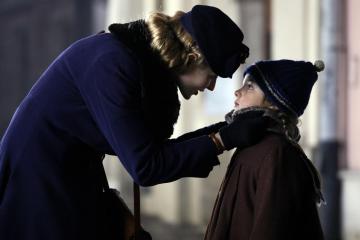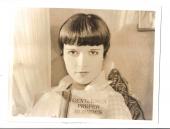'Joanna' tells a haunting tale
The sudden and permanent disappearance of loved ones -- so appallingly common in Poland during World War II -- was an unspeakable thing for adults, an unthinkable one for children. But they are forced to do much painful thinking and speaking about it in director Feliks Falk's "Joanna."
The title character of this gut-wrenching drama, set in Krakow during the Nazi occupation, is a gentle young woman whose soldier-husband has not been heard from since the first days of the war. Joanna (Urszula Grabowska), a devout Catholic and an optimist, is better off than most: She has an education, a large comfy apartment and strong family support.
But she also has a brave -- most would say foolishly soft -- heart, which leads her to shelter a little Jewish girl named Roza (Sara Knothe), whose mother was caught during a vicious Nazi round-up.
Nothing could be more dangerous, of course. Joanna is already under observation by the occupiers, and an object of envy by fellow Poles, who covet her spacious living quarters. The little girl's presence there is a constant source of fear. A cough can mean exposure -- to death, not germs. Joanna's "helpful" landlady is suspicious. Every knock on the door or glance from a neighbor is pregnant with potential disaster. No one, not even her anti-Nazi parents, can be trusted (or endangered) with her secret. Food is running short and, soon enough, she loses her charwoman's job.
Ah, but there is Roza -- and their budding, deepening relationship. The scruffy little girl with the mane of wild black hair is a tiny Anne Frank, half the size and age of the immortal diarist. Joanna teaches her to write the word "Christ," but they both know that neither of them stands a chance if their secret is discovered.
A middle-of-the-night Nazi inspection would seem to make that inevitable. But the German officer in charge (Joachim Paul Assbock) has a certain Achilles heel -- plus an interest in Joanna's French dictionary.
What will a woman do to save a child? What won't she do? Who can ever calculate the millions of awful Sophie's choices in Poland, where even coerced -- let alone voluntary -- cooperation with the Nazis would be considered collaboration?
The subtle, naturalistic performances under writer-director Falk bring this tragedy to luminous life. Ms. Grabowska's Joanna is reminiscent of Ingrid Bergman -- calm, strong, restrained, resilient. Her incredible robin-egg blue eyes will haunt you, and her every instinct as an actress is convincing.
If little Sara Knothe's lustrous eyes were any bigger, they would swallow the world. She is a girl who never laughs and rarely cries. The loneliness of the heroine and the innocence of the girl make for an eternal connection of lost souls -- the love between a childless woman and a motherless child.
Piotr Sliskowski's perfect cinematography -- in the muted tones of that grey-dreary era -- and an excellent original score by Bartlomiej Gliniak complement Falk's powerful script and somber vision: Sheltering Roza is Joanna's personal Way of the Cross. She is equally hounded and betrayed by her own people, no less than the Nazis. Polish cinema doggedly refuses to forget or let us forget.
"Joanna" is not for the faint of heart, and its conclusion is not for lovers of the simplistic. (High tragedy rarely is.) We insist on knowing the good or bad outcome. Does the pain of "not knowing" disturb you? Do you think that might be the point?
The sudden and permanent disappearance of loved ones -- so appallingly common in Poland during World War II -- was an unspeakable thing for adults, an unthinkable one for children. But they are forced to do much painful thinking and speaking about it in director Feliks Falk's "Joanna."
The title character of this gut-wrenching drama, set in Krakow during the Nazi occupation, is a gentle young woman whose soldier-husband has not been heard from since the first days of the war. Joanna (Urszula Grabowska), a devout Catholic and an optimist, is better off than most: She has an education, a large comfy apartment and strong family support.
But she also has a brave -- most would say foolishly soft -- heart, which leads her to shelter a little Jewish girl named Roza (Sara Knothe), whose mother was caught during a vicious Nazi roundup.
Nothing could be more dangerous, of course. Joanna is already under observation by the occupiers, and an object of envy by fellow Poles, who covet her spacious living quarters. The little girl's presence there is a constant source of fear. A cough can mean exposure -- to death, not germs. Joanna's "helpful" landlady is suspicious. Every knock on the door or glance from a neighbor is pregnant with potential disaster. No one, not even her anti-Nazi parents, can be trusted (or endangered) with her secret. Food is running short and, soon enough, she loses her charwoman's job.
Ah, but there is Roza -- and their budding, deepening relationship. The scruffy little girl with the mane of wild black hair is a tiny Anne Frank, half the size and age of the immortal diarist. Joanna teaches her to write the word "Christ," but they both know that neither of them stands a chance if their secret is discovered.
A middle-of-the-night Nazi inspection would seem to make that inevitable. But the German officer in charge (Joachim Paul Assbock) has a certain Achilles heel -- plus an interest in Joanna's French dictionary.
What will a woman do to save a child? What won't she do? Who can ever calculate the millions of awful Sophie's choices in Poland, where even coerced -- let alone voluntary -- cooperation with the Nazis would be considered collaboration?
The subtle, naturalistic performances under writer-director Falk bring this tragedy to luminous life. Ms. Grabowska's Joanna is reminiscent of Ingrid Bergman -- calm, strong, restrained, resilient. Her incredible robin-egg blue eyes will haunt you, and her every instinct as an actress is convincing.
If little Sara Knothe's lustrous eyes were any bigger, they would swallow the world. She is a girl who never laughs and rarely cries. The loneliness of the heroine and the innocence of the girl make for an eternal connection of lost souls -- the love between a childless woman and a motherless child.
Piotr Sliskowski's perfect cinematography -- in the muted tones of that gray-dreary era -- and an excellent original score by Bartlomiej Gliniak complement Falk's powerful script and somber vision: Sheltering Roza is Joanna's personal Way of the Cross. She is equally hounded and betrayed by her own people, no less than the Nazis. Polish cinema doggedly refuses to forget or let us forget.
"Joanna" is not for the faint of heart, and its conclusion is not for lovers of the simplistic. (High tragedy rarely is.) We insist on knowing the good or bad outcome. Does the pain of "not knowing" disturb you? Do you think that might be the point?






